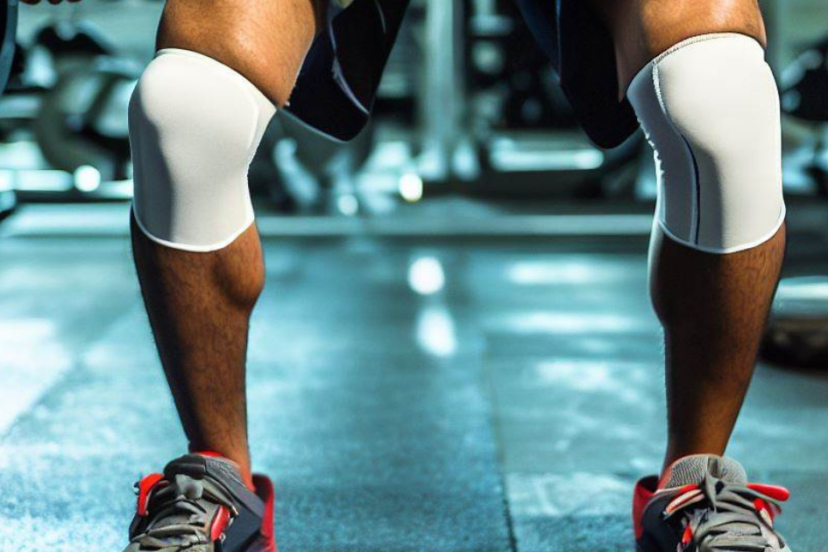Knee Sleeves for Weightlifting: Enhancing Performance and Protecting Joints
When it comes to weightlifting, protecting your joints and optimizing performance are essential. Knee sleeves have gained popularity as an accessory that can provide support, stability, and protection during weightlifting sessions. In this article, I will guide you through the benefits of using knee sleeves for weightlifting, explain the different types available, and offer helpful suggestions for choosing and using the right knee sleeves for your needs.
Knee Sleeves for Weightlifting: Boosting Performance and Reducing Risk
Knee sleeves are designed to provide support and stability to the knee joint during weightlifting exercises, from performing deadlifts or simple squats. By offering compression, warmth, and proprioceptive feedback, knee sleeves can enhance performance and reduce the risk of injuries. Whether you’re a seasoned weightlifter or just starting your fitness journey, incorporating knee sleeves into your routine can make a significant difference in your comfort, performance, and joint health.
Types of Knee Sleeves
There are different types of knee sleeves available, each with its own unique features and advantages:
1. Neoprene Knee Sleeves: Neoprene knee sleeves are the most common type and are known for their excellent compression and heat retention properties. They provide stability, warmth, and joint support during weightlifting sessions.
2. Fabric Knee Sleeves: Fabric knee sleeves are typically made of a blend of materials such as nylon, polyester, and elastane. They offer a balance between compression and breathability, providing support while allowing for greater freedom of movement.
Factors to Consider When Choosing Knee Sleeves
When selecting knee sleeves for weightlifting, consider the following factors:
1. Proper Fit and Sizing: Ensure that the knee sleeves fit snugly around your knees without restricting your range of motion. A proper fit is crucial for optimal effectiveness and comfort.
2. Thickness and Compression Level: Choose knee sleeves with the appropriate thickness and compression level based on your individual needs and preferences. Thicker sleeves may provide more support, while lighter ones offer greater flexibility.
3. Durability and Quality: Look for knee sleeves made of high-quality materials that can withstand the demands of weightlifting and provide long-lasting durability. Reinforced stitching and quality construction contribute to the overall durability of the sleeves.
4. Balancing Support and Freedom of Movement: Consider the balance between support and freedom of movement. While knee sleeves should provide stability, they should not restrict your natural range of motion during weightlifting exercises.
How Knee Sleeves Aid in Weightlifting Performance

Using knee sleeves during weightlifting can offer a range of benefits:
1. Enhanced Stability and Proprioception: Knee sleeves provide compression and support, promoting better proprioception and stability of the knee joint. This can result in improved form, technique, and overall performance.
2. Increased Joint Warmth and Blood Flow: Knee sleeves retain heat, keeping the joint warm during exercise. This increased warmth can improve blood circulation, reduce stiffness, and enhance flexibility.
3. Reduction of Knee Pain and Discomfort: The compression provided by knee sleeves can help alleviate knee pain and discomfort that may arise during weightlifting exercises, particularly for individuals with previous knee issues.
4. Injury Prevention and Protection of Ligaments: Knee sleeves offer a layer of protection to the ligaments and tendons surrounding the knee joint. They can help minimize the risk of strains, sprains, and other common knee injuries associated with weightlifting.
Guidelines for Using Knee Sleeves in Weightlifting
To make the most of your knee sleeves during weightlifting, consider the following guidelines:
1. Proper Technique for Wearing Knee Sleeves: Slide the knee sleeves up over your knees, ensuring they are positioned p correctly with the kneecap in the center. Smooth out any wrinkles for a comfortable fit.
2. Time and Duration of Usage: Wear knee sleeves during your entire weightlifting session to provide continuous support. However, if you experience discomfort or swelling, adjust the usage according to your comfort level.
3. Maintenance and Care: Regularly clean and air-dry your knee sleeves to maintain hygiene and prevent odor buildup. Follow the manufacturer’s instructions for proper care and longevity of the sleeves.
5 Recommended Sleeves
1. Best Supportive Features: Iron Bull Strength
The Iron Bull Strength 7mm Knee Sleeves offer premium 7mm Neoprene Flex-Material, providing maximum joint compression, warmth, and stability during weightlifting and powerlifting.

Pros:
Cons:
2. Best Value and Convenience: Gymreapers
The Gymreapers Knee Sleeves come as a pair and include a gym bag, offering not only quality knee support but also added value and storage for your gym essentials.

Pros:
Cons:
3. Best Heavy Training Support: Stoic
The Stoic Knee Sleeves stand out with their ultra-high density 7MM thick neoprene construction, making them an ideal choice for heavy leg training and professional use.

Cons:
4. Best Anatomical Fit: Rehband
The Rehband Rx Knee Support provides a patented anatomical fit, offering flexibility, comfort, and targeted knee support that adapts to your body’s movements.

Pros:
Cons:
5. Best Nonslip Design: ProFitness
The ProFitness Knee Sleeves feature a nonslip, gripping technology that ensures they stay securely in place during squats, lunges, and deadlifts, enhancing your workout experience.

Pros:
Cons:
Editors pick

Real-Life Testimonials and Success Stories
Many weightlifters have experienced the benefits of using knee sleeves firsthand. Their success stories and testimonials highlight improved performance, enhanced stability, and reduced knee discomfort during weightlifting exercises. Listening to their experiences can provide motivation and encouragement to explore the advantages of knee sleeves for yourself.
Closing remarks
When it comes to weightlifting, protecting your knees and optimizing performance are key. Knee sleeves offer a valuable solution by providing support, stability, and protection to the knee joint during weightlifting exercises. By choosing the right knee sleeves and incorporating them into your routine, you can enhance your performance, reduce the risk of injuries, and ensure the longevity of your weightlifting journey.
FAQs:
1. Can knee sleeves improve my lifting technique?
Knee sleeves can enhance lifting technique by providing stability and proprioceptive feedback. They promote better form and joint alignment, leading to improved lifting technique.
2. Are knee sleeves suitable for all weightlifters?
Knee sleeves are generally suitable for weightlifters of all levels, from beginners to advanced athletes. However, it’s essential to consider individual needs and preferences. If you have any specific knee conditions or concerns, it’s recommended to consult with a healthcare professional before using knee sleeves.
3. Can knee sleeves be worn outside of weightlifting sessions?
While knee sleeves are primarily designed for weightlifting, they can also be used for other activities that involve knee strain or impact. Some individuals find them helpful during sports, running, or other physical activities that put stress on the knees.
4. How do I know if my knee sleeves need to be replaced?
Over time, knee sleeves may lose elasticity and compression, reducing their effectiveness. Signs that your knee sleeves may need replacement include noticeable wear and tear, loss of compression, or a loose fit that no longer provides adequate support.
5. Can knee sleeves prevent knee injuries entirely?
While knee sleeves can offer support and protection, they cannot guarantee complete prevention of knee injuries. They are designed to reduce the risk of certain injuries and provide added stability, but it’s essential to prioritize proper form, technique, and gradual progression in your weightlifting routine.
*We may earn a commission from purchases made through our links, at no cost to you. This does not affect our product recommendations. Please see our disclosure to learn more.
![Urban Health Hive]](https://urbanhealthhive.com/wp-content/uploads/2023/05/cropped-cropped-Health_Logo.png)



